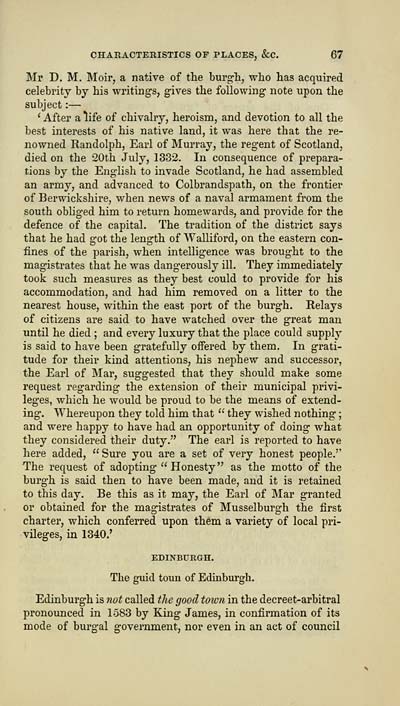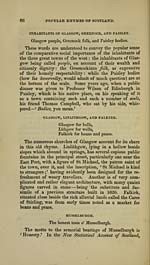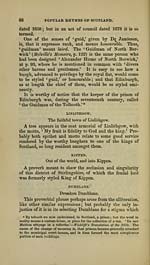Download files
Complete book:
Individual page:
Thumbnail gallery: Grid view | List view

CHARACTERISTICS OF PLACES, &C. 67
Mr D. M. Moir, a native of the burg-la, who has acquired
celebrity by his writing's, g-ives the following note upon the
subject : —
' After a life of chivalry, heroism, and devotion to all the
best interests of his native land, it was here that the re-
nowned Randolph, Earl of Murray, the regent of Scotland,
died on the 20th July, 1332. In consequence of prepara-
tions by the English to invade Scotland, he had assembled
an army, and advanced to Colbrandspath, on the frontier
of Berwickshire, when news of a naval armament from the
south obliged him to return homewards, and provide for the
defence of the capital. The tradition of the district says
that he had got the length of Walliford, on the eastern con-
fines of the parish, when intelligence was brought to the
magistrates that he was dangerously ill. They immediately
took such measures as they best could to provide for his
accommodation, and had him removed on a litter to the
nearest house, within the east port of the burgh. Relays
of citizens are said to have watched over the great man
until he died ; and every luxury that the place could supply
is said to have been gratefully offered by them. In grati-
tude for their kind attentions, his nephew and successor,
the Earl of Mar, suggested that they should make some
request regarding the extension of their municipal privi-
leges, which he would be proud to be the means of extend-
ing. Whereupon they told him that " they wished nothing ;
and were happy to have had an opportunity of doing what
they considered their duty." The earl is reported to have
here added, " Sure you are a set of very honest people.''
The request of adopting " Honesty" as the motto of the
burgh is said then to have been made, and it is retained
to this day. Be this as it may, the Earl of Mar granted
or obtained for the magistrates of Musselburgh the first
charter, which conferred upon them a variety of local pri-
vileges, in 1340.'
EDINBURGH.
The guid toun of Edinburgh.
Edinburgh is 7iot called the good toivn in the decreet-arbitral
pronounced in 1583 by King James, in confirmation of its
mode of burgal government, nor even in an act of council
Mr D. M. Moir, a native of the burg-la, who has acquired
celebrity by his writing's, g-ives the following note upon the
subject : —
' After a life of chivalry, heroism, and devotion to all the
best interests of his native land, it was here that the re-
nowned Randolph, Earl of Murray, the regent of Scotland,
died on the 20th July, 1332. In consequence of prepara-
tions by the English to invade Scotland, he had assembled
an army, and advanced to Colbrandspath, on the frontier
of Berwickshire, when news of a naval armament from the
south obliged him to return homewards, and provide for the
defence of the capital. The tradition of the district says
that he had got the length of Walliford, on the eastern con-
fines of the parish, when intelligence was brought to the
magistrates that he was dangerously ill. They immediately
took such measures as they best could to provide for his
accommodation, and had him removed on a litter to the
nearest house, within the east port of the burgh. Relays
of citizens are said to have watched over the great man
until he died ; and every luxury that the place could supply
is said to have been gratefully offered by them. In grati-
tude for their kind attentions, his nephew and successor,
the Earl of Mar, suggested that they should make some
request regarding the extension of their municipal privi-
leges, which he would be proud to be the means of extend-
ing. Whereupon they told him that " they wished nothing ;
and were happy to have had an opportunity of doing what
they considered their duty." The earl is reported to have
here added, " Sure you are a set of very honest people.''
The request of adopting " Honesty" as the motto of the
burgh is said then to have been made, and it is retained
to this day. Be this as it may, the Earl of Mar granted
or obtained for the magistrates of Musselburgh the first
charter, which conferred upon them a variety of local pri-
vileges, in 1340.'
EDINBURGH.
The guid toun of Edinburgh.
Edinburgh is 7iot called the good toivn in the decreet-arbitral
pronounced in 1583 by King James, in confirmation of its
mode of burgal government, nor even in an act of council
Set display mode to: Large image | Transcription
Images and transcriptions on this page, including medium image downloads, may be used under the Creative Commons Attribution 4.0 International Licence unless otherwise stated. ![]()
| Early Gaelic Book Collections > J. F. Campbell Collection > Popular rhymes of Scotland > (75) |
|---|
| Permanent URL | https://digital.nls.uk/81375494 |
|---|
| Description | Volumes from a collection of 610 books rich in Highland folklore, Ossianic literature and other Celtic subjects. Many of the books annotated by John Francis Campbell of Islay, who assembled the collection. |
|---|
| Description | Selected items from five 'Special and Named Printed Collections'. Includes books in Gaelic and other Celtic languages, works about the Gaels, their languages, literature, culture and history. |
|---|

